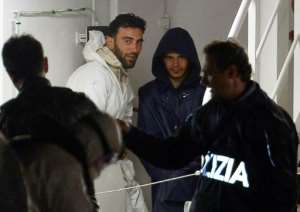
Rome (AFP) - Italian judges are to rule Tuesday whether the alleged captain of a migrant boat that sank in 2015, killing up to 900 people, is responsible for the Mediterranean's worst disaster since World War II.
Prosecutors in the Sicilian port city of Catania have called for Tunisian Mohammed Ali Malek to serve 18 years for multiple manslaughter, human trafficking and causing the tragedy after the packed boat capsized after colliding with a freighter coming to its aid.
They have also demanded he pay three million euros ($3.18 million) in compensation for a tragedy that saw Italian forensic scientists spend months sorting through decomposed body parts to count the victims.
Syrian Mahmoud Bikhit, the alleged first mate, faces six years behind bars for his role in the tragedy off the coast of Libya.
Both have claimed they were simple migrants and had been made to steer the boat by the real traffickers.
But survivors told investigators that Malek was the captain and that it was his lack of sailing skills that caused the deadly collision.
The boat was carrying people largely from The Gambia, Senegal and Mali, as well as Bangladesh, the Ivory Coast and Ethiopia. Only 28 survived.
'Scapegoat'
 Tunisian national Mohammed Ali Malek (L) and Syrian national Mahmud Bikhit both claimed they were simple migrants and had been made to steer the boat by the real traffickers
Tunisian national Mohammed Ali Malek (L) and Syrian national Mahmud Bikhit both claimed they were simple migrants and had been made to steer the boat by the real traffickers
Up to 900 people were packed into the 27-metre (90-foot) boat when it left Libya, according to forensic scientists who spent months examining body bags only to discover many contained the remains of more than one person.
Firefighters who recovered the mangled bodies from the rotting ship said they had been "packed in like on the trains for Auschwitz".
The Sicilian court will hear from a survivor who lost relatives on the night of the April 18-19 wreck before the prosecution and defence give their closing arguments.
The judges will then retire to consider the verdict, which is expected to be given at around 1200 GMT.
The vessel sank in pitch darkness after running into the Portuguese freighter King Jacob which had raced to its rescue, the collision sending its passengers over to one side and causing the vessel to tip over.
The freighter's captain, Abdullah Ambrousi, said he saw the migrant boat sailing erratically and cut the freighter's engines to avoid a crash, but the smaller vessel speed up and rammed into the King Jacob.
Malek has claimed the real captain died in the wreck and he is being scapegoated by the other survivors because he is Tunisian.
Italy's navy had the grisly task of raising the corpse-packed trawler from the seabed this year after the government promised to give the victims decent burials as a symbol of respect for all the migrants who have died trying to reach Europe's shores. Only the salvage of the wreck cost ten million euros.
Tooth and nail
Italian firefighters' spokesman Luca Cari said the decomposing migrant bodies were found everywhere, from the well of the anchor chain to the tiny underfloor compartment where the bilge pump sits, to the engine room.
It was clear from their positions that many had fought tooth and nail to get out when the boat rolled -- a struggle which proved futile.
Fingerprints, DNA samples and distinguishing body marks were collected on file from the corpses in the hope the data may helping relatives seeking lost loved ones.
Over 12,000 people are known to have lost their lives in the Mediterranean since the current migrant crisis erupted in 2013. Aid agencies say it is likely many more disappeared without trace after being abandoned on the high seas by traffickers.
The departures have not stopped despite the turn in the weather as winter sets in. A record number of 175,000 people have arrived on Italy's shores this year, with another 678 brought to Catania on Monday, including a newborn baby.




 We’ll no longer tolerate your empty, unwarranted attacks – TUC blasts Prof Adei
We’ll no longer tolerate your empty, unwarranted attacks – TUC blasts Prof Adei
 Bawumia donates GHc200,000 to support Madina fire victims
Bawumia donates GHc200,000 to support Madina fire victims
 IMF to disburse US$360million third tranche to Ghana without creditors MoU
IMF to disburse US$360million third tranche to Ghana without creditors MoU
 Truck owner share insights into train collision incident
Truck owner share insights into train collision incident
 Paramount chief of Bassare Traditional Area passes on
Paramount chief of Bassare Traditional Area passes on
 Two teachers in court over alleged illegal possession of BECE papers
Two teachers in court over alleged illegal possession of BECE papers
 Sunyani: Victim allegedly shot by traditional warriors appeals for justice
Sunyani: Victim allegedly shot by traditional warriors appeals for justice
 Mahama vows to scrap teacher licensure exams, review Free SHS policy
Mahama vows to scrap teacher licensure exams, review Free SHS policy
 Government will replace burnt Madina shops with a new three-story, 120-store fac...
Government will replace burnt Madina shops with a new three-story, 120-store fac...
